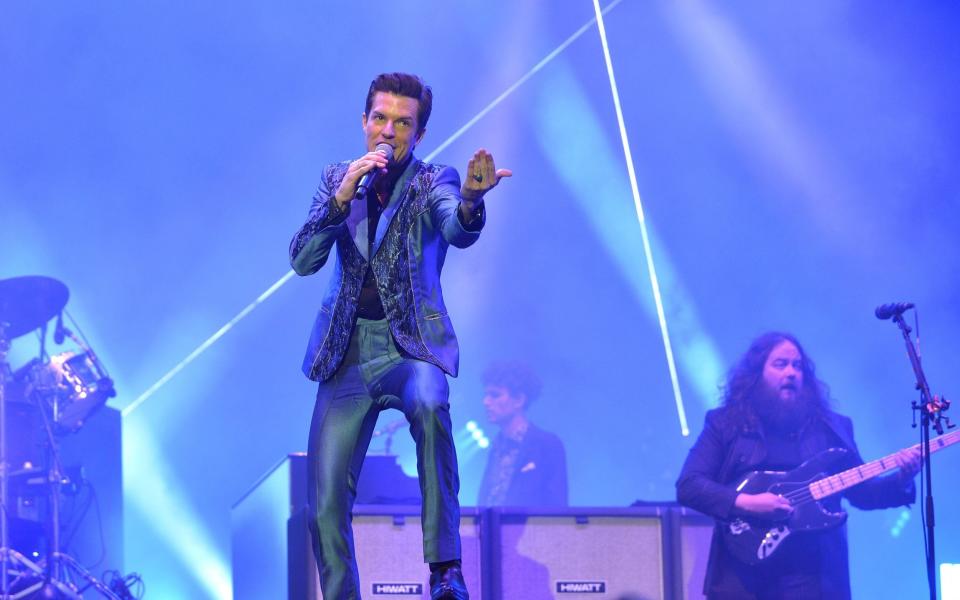The Killers, Imploding The Mirage, review: a man down, but rocking louder than ever

Stadiums may be temporarily shuttered but that hasn’t dampened the scale and drama of The Killers’ stadium rock sound. Singer, keyboard player and chief songwriter Brandon Flowers sympathetically describes one of his plucky “black top, white trash” characters as having the tendency “to go straight from zero to the fourth of July” which is pretty much his approach to songcraft.
Things may start out in a dreamy wash of ambient synths and gentle melodies, but listeners are pretty much guaranteed it won’t be long before the band comes roaring in like a squadron of high-powered formation-flying jets dive-bombing an Independence Day parade, and Flowers is yelling the tune from the strained top of his vocal range to be heard above the fireworks. The Killers’ sixth album, Imploding the Mirage, is what you would get if U2 covered Bruce Springsteen, backed by the Electric Light Orchestra, broadcasting from a neon-lit Zeppelin hovering over Mount Rushmore. It is not exactly subtle, but boy, does it get your attention.
You might have thought lockdown was an opportunity for Flowers and his cohorts to downsize. The Killers rose up as part of the reheated new wave rock of the early 2000s, nailing a template of pop hooks, indie looks, 1980s synths and skinny guitars that an awful lot of young radio-friendly bands have stuck to ever since. Like American contemporaries The Strokes and Kings of Leon, their Anglocentric pop rock found favour in the UK before the US, but The Killers finally scored an American Billboard number one album with 2017’s Wonderful Wonderful.
Since then, however, inventive guitarist Dave Keuning has taken a leave of absence, while bassist Mark Stoermer has become semi-detached, dropping out of the touring band and only showing up for studio sessions. All members have left the bright lights of Las Vegas behind them, with Flowers settling back with his family into the Mormon community of Utah where he was raised.
If that sounds like a recipe for a stripped back semi-acoustic album of midlife introspection, then you would be discounting the thunderous influence of drummer Ronnie Vannucci Jr. There’s a break nearly two minutes into Dying Breed that sounds like Vannucci has been listening to Flowers motoring pleasantly along to a Krautrock drum machine (sampling Can and Neu!), and become so infuriated that he has just battered his way into the session with a sledgehammer and laid waste to everything in sight. By the end, it sounds like he’s literally setting off explosions in the studio.
Rather than leaving an empty creative space to be filled, the absence of Keuning has provided an opportunity to expand The Killers’ already expansive sonic palette with some genuinely impressive guests. Flowers has co-produced and mainly co-written this album with multi-instrumentalist Jonathan Rado of psych rockers Foxygen and producer Shawn Everett. The latter has previously worked with The War on Drugs, a band who offer a slightly more downbeat approach to updating Springsteen’s heartlands rock for our synthetic pop era. Their leader Adam Granduciel lends a sweet flare of slide to the burbling electro drivetime Blowback, a song that sounds like Tom Petty channelling The Pet Shop Boys.

Fleetwood Mac’s Lindsey Buckingham rips out a cascade of astonishing notes that machine guns the ending of drivetime anthem Caution into bloody shreds. Virtuoso Americana guitarist Blake Mills is also on hand for six string splendour but it’s not all high-testosterone action. Flowers’s ludicrous boast that “We’re cut from a stained-glass mountain” on Dying Breed is a fair metaphor for The Killers’ oeuvre, conveying both the macho swagger of their monumental rock and a more delicate spirit of sacred beauty that softens their attack.
Sensitively portrayed women loom large in Flowers’ songs and much of the last Killers album centred on his wife Tana’s PTSD from a difficult childhood. Her traumas still figure in his pen portraits of young women escaping limited circumstances. “I was a timid Rockwellian boy / She was tattooed and ready to deploy” is the smart opening couplet of the title track, but this time around, The Killers have actually left some space for women’s voices. The always exquisite vocals of the great KD Lang offer words of wisdom to a lost soul lamenting the ghost of his mother on Lightning Field, which sounds like eighties Peter Gabriel being sledgehammered by Vannucci. And leftfield singer-songwriter Weyes Blood offers ethereal counterpoint to Flowers on the spiritual My God, taking off into the ether for a gorgeous coda that would risk drifting into Enya chill-out territory if Vannucci wasn’t strafing it with friendly fire.
One thing The Killers have never learned to do is dial it down. But it’s hard to complain when they continually deliver songs so perfectly formed and passionately performed, filled with spiritual aspiration, emotional conviction and singalong glory. As Flowers puts it rather melodramatically on Running Like the Wind: “Give me a song that I may sing / That cuts like a canyon and rides on a wing / And give a heart that I may stand / For what I believe in.” Or as he puts it almost as eloquently on the refrain from Dying Breed: “Na-na-na-na-na / Na-na-na-na-na / Na-na-na-na-na / Na-na-na-na-na-na.”
Just wait till they’re back playing that to stadium crowds. It may be interesting to hear what Flowers would do if he could resist the urge to turn the dial up to 11 every time, but you really can’t fault his ambition when he delivers another album that is all killer, no filler.


